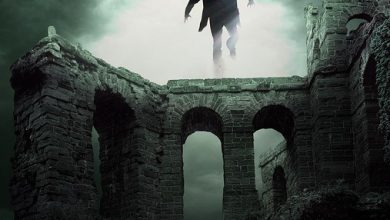The Guest by Albert Camus features Daru, a schoolmaster, and Balducci, a gendarme, and an Arab prisoner. ‘The Guest’ highlights Camus’s philosophical insights, and his political position during the Algerian War. This is an ambiguous story dealing, among others, with moral dilemma, and the exercise of free will, set against the backdrop of existentialism and the Algerian War.
The Guest’ was first published in 1957 as part of the collection Exile and the Kingdom.
‘The Guest’ SUMMARY
The story begins with Daru, a schoolmaster, watching two men climbing a rocky terrain. One of them is the gendarme Balducci while the other is an Arab prisoner. While the gendarme is riding a horse, the Arab is on foot. This is a particularly lonely part of Algeria that has been plagued with drought and poverty for a long time now, and due to a recent blizzard, the pupils have not visited Daru’s school for days.
Daru welcomes the two persons and feeds them tea. Then Balducci informs Daru that he was supposed to bring the Arab prisoner to Daru and that Daru must take the prisoner to the police in Tinguit now. Daru comes to know that the prisoner killed his cousin, slitting his throat. While Balducci does not think the prisoner is a rebel, he tells Daru to be careful and hands over a gun to him. However, Daru refuses to take the prisoner to Tinguit since he finds this dishonorable. Balducci can well understand Daru’s hesitation but insists that he must do what the law asks of him, and tells him further how men have to do a lot of things when there is a war. Daru, nevertheless, is adamant and refuses to obey the order. Balducci leaves Daru with resentment.
Daru now shows the Arab prisoner hospitality. Giving him food and a warm bed to sleep in. His attitude towards the Arab is ambiguous; he certainly does not condone the crime the prisoner committed but is somehow not really afraid of him. In fact, he wishes he flees the home so that he does not have to do anything at all. However, though the prisoner walks out of the house at night, he does not run away; Daru is stuck with the necessity to decide on a course of action.
The next morning, Daru takes the Arab man away from the house, and hands over some food and a thousand francs to him. He tells the Arab that to the East lies Tinguit and to the south lies the path to the nomads. The Arab has two options: he can either take the road to Tinguit and turn himself over to the police or he can go to the nomads who will take him in. Daru leaves the prisoner at this point. Daru sees after a while that the Arab has taken the way to Tinguit. When he is back to his house, Daru sees written on the blackboard a horrific message:
“You handed over our brother. You will pay for this.”
‘The Guest’ ANALYSIS
‘The Guest’ directly emerges from the various philosophical and political contexts pertaining to Albert Camus’s life and the period he was writing in. The central philosophical question raised in the story is that of existentialism. Camus’s view was that the universe was an irrational place, indifferent to human beings. A state of ‘the absurd’ emerged when human beings met with this face of the universe while striving to make meaning out of their existence. Camus, however, posited that one could still carve out a place for a meaningful life in this otherwise irrational cosmos by making independent decisions and sticking to them. Daru, in this story, fails to make such a decision at the end, giving in to a moral dilemma. And Camus himself faced this moral dilemma in the 1950s owing to the immediate political conditions surrounding him.
The Algerian War lasted from 1954 to 1962. Algeria fought a long and violent war against its colonizer France, eventually attaining freedom in 1962. Camus had a significant role as a broker in ensuring peace and non-hostility between the two parties since he considered both places his home. He decided to stay politically neutral, not supporting either of the two groups because he considered both of these belligerent parties victims of violence which spelled doom for the populace of both the places. However, as the struggle wore on and eventually took the shape of war, he found the neutral stance difficult to maintain. His palpitations at the atrocities happening on both sides brought him face to face with a moral dilemma that can be seen in Daru in ‘The Guest’.
THEMES
Making choices is a necessity in life, and ‘The Guest’ shows how even if making decisions is a difficult job, not making any decision at pivotal moments can bring about unforeseen circumstances. And humans’ ability to decide things for themselves is one way, Camus holds, of confronting the ‘absurdity’ of existence.
The description of the plateau by Camus neatly mirrors his description of the universe as an irrational and indifferent place. The irrationality is brought about thus: ‘Snow had suddenly fallen in mid-October after eight months of drought without the transition of rain, and the twenty pupils, more or less, who lived in the villages scattered over the plateau had stopped coming.’ On the other hand, the indifference of the universe is seen in the desert thus: ‘No one in this desert, neither he nor his guest, mattered.’ So far, Daru has exerted his free will in making a home out of this place but Balduchhi’s command suddenly throws him into an abyss of moral dilemma he cannot get out of. This dilemma is evocatively presented in the text:
‘That man’s stupid crime revolted him, but to hand him over was contrary to honor. Merely thinking of it made him smart with humiliation. And he cursed at one and the same time his own people who had sent him this Arab and the Arab too who had dared to kill and not managed to get away. Daru got up, walked in a circle on the terrace, waited motionless, and then went back into the schoolhouse.’
A look at the then political scenario will swiftly make clear that Daru’s dilemma is Camus’s own too, albeit pertaining to a different matter. Just like Daru here, Camus himself did not condone the violent and reckless ways the Arabs resorted to against the French during the Algerian war. However, the French way of handling the situation did not find support with Camus either. The philosophical and political contexts of the time are deftly fused in this short story.
There are dire consequences of failing to make a decision, especially since making decisions is the sole tool that helps one survive the absurdity of the universe. Daru faces the consequence of this in the end; he sees a threat written on the classroom board, probably coming from the Arab prisoner’s compatriots who might have followed Daru’s actions so far. In the threat, Daru is accused of making a decision he did not actually make. Not only is this another example of the irrationality of the universe’s workings, but this turn of events also shows how Daru actually lapses into a state of absurdity and meaninglessness once again. The last line of the story -’ In this vast landscape he had loved so much, he was alone’- indicates how Daru’s efforts at making a meaningful existence out in this lonely desert are undone by his inability to make a pivotal decision. In the context of the historical event of the Algerian War, this inability also indicates one’s failure as a political being. From Camus’s philosophical viewpoint, making a choice is a moral responsibility for all human beings. After all, it is what gives life value in an otherwise absurd existence. However, Daru actually tries to run away from this responsibility several times in the story.
Camus’s existentialist philosophy holds that freedom can only be enjoyed through one’s exertion of one’s free will. Thus, to decide is to taste freedom. When Balducchi says to Daru, “No, I won’t tell them anything. If you want to drop us, go ahead. I’ll not denounce you”, it is Daru’s cue to exert his freedom by making a choice and stick to it. Daru fails in this regard. This story, in a way, could be read as Camus’s critique of his own former decision to remain politically neutral in the Algeria-France conflict.
The actual Algerian War is also hinted at in the story when Balducci says to Daru, “Things are brewing, it appears. There is talk of a forthcoming revolt.” Also, Camus is careful enough to indicate the true extent of the miseries the Algerians were going through in those years. The poverty and the hardships inflicted by the long drought have significantly been mention in the story.
CHARACTERS IN THE STORY
Daru: A Frenchman and a schoolteacher. Residing on a lonely plateau mostly all by himself, he is ordered to take the Arab prisoner to the police in Tinguit. However, he cannot make up his mind as to what he should do about it. The central themes of the story are played out through Daru.
Balducci: the gendarme or policeman. He delivers the Arab prisoner to Daru. He is not a vicious policeman and he is sympathetic to Daru’s hesitations about turning the prisoner over to the police. But he does not abandon his duty.
The Arab Prisoner: accused of the crime of killing his cousin. Daru hopes he runs away at night but he does not, keeping Daru locked in the moral dilemma. At the end of the story, he chooses to turn himself over to the police.
LITERARY DEVICES
The crafting of Daru’s character in order to symbolically reflect the prevalent philosophical and political discourses has been noted above. The character of Balducci becomes a foil to Daru because unlike the latter, he does not give in to moral dilemmas. He does not abandon his duty.
The state of loneliness has been used as an effective motif in the story. It is mentioned how Daru used to feel very lonely in the initial days of his stay on the plateau. Towards the end, a sense of sheer loneliness grips him again. Loneliness here is equivalent to a state of existence in absurdity.
The use of irony is subtle but significant in the story. For example, on the blackboard in the class where Daru teaches, four French rivers are drawn. The irony is that the Arab community from which Daru’s students come were fighting against the French now and they would not really care about French rivers. And of course, the ending of the story itself is ironic, whereby Daru is made responsible by unknown figures for a choice he could never bring himself to make.
NARRATIVE STYLE AND TECHNIQUES
The story is narrated by a third-person limited narrator. The narrator reports events as they happen, thereby heightening the sense of suspense surrounding the actions of Daru. Also, the narration makes use of free indirect discourse whereby Daru’s inner thoughts are revealed to the readers by the third-person narrator.
THE TITLE OF THE STORY
The French word for ‘guest’, ‘L’Hôte’, can be translated as both ‘guest’ and ‘host’. This pun interestingly highlights one of the principal thematic concerns of the story. Daru can be called both the guest and the host. He is the host, obviously, to the Arab prisoner since it is his house where the latter is brought. But, he, a Frenchman, is also a guest in the land that belongs to the Arabs, the Arabs were claiming at this point in history.


